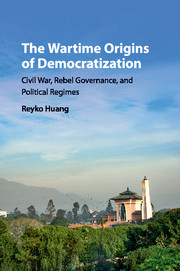Book contents
- Frontmatter
- Contents
- List of Figures
- List of Tables
- List of Acronyms
- Acknowledgments
- 1 Introduction
- 2 War-Making, Mobilization, and Democratization
- 3 Rebel Governance: How Rebels Interact with Ordinary People During Conflict
- 4 Testing the Effects of Rebel Governance on Postwar Democratization
- 5 Tracing the Steps from War Time to Peace Time: Case Studies Overview
- 6 War and Change in Nepal
- 7 War and Postwar Regime Formation in Uganda, Tajikistan, and Mozambique
- 8 Conclusion
- Appendix Rebel Governance Dataset: Notes, List of Cases, and Summary Statistics
- Bibliography
- Index
5 - Tracing the Steps from War Time to Peace Time: Case Studies Overview
Published online by Cambridge University Press: 05 September 2016
- Frontmatter
- Contents
- List of Figures
- List of Tables
- List of Acronyms
- Acknowledgments
- 1 Introduction
- 2 War-Making, Mobilization, and Democratization
- 3 Rebel Governance: How Rebels Interact with Ordinary People During Conflict
- 4 Testing the Effects of Rebel Governance on Postwar Democratization
- 5 Tracing the Steps from War Time to Peace Time: Case Studies Overview
- 6 War and Change in Nepal
- 7 War and Postwar Regime Formation in Uganda, Tajikistan, and Mozambique
- 8 Conclusion
- Appendix Rebel Governance Dataset: Notes, List of Cases, and Summary Statistics
- Bibliography
- Index
Summary
The previous chapter showed that a significant statistical correlation exists between rebels’ wartime extraction of resources from civilians and post–civil war democratization, and that the correlation is robust to different model specifications and the inclusion of a range of control variables. On the other hand, regression analysis provided no support for the rebel statebuilding hypothesis. It also found, consistent with existing studies, that negotiated settlements and the post–Cold War context aid democratization among post–civil war states while identity-based wars make the outcome less likely.
Leveraging the benefits of combining distinct research methods in a single study, the following two chapters use case studies to test the causal mechanisms proposed in my theory. Case studies are particularly important in this study for two reasons. First, when the outcome of interest is substantively complex and multifaceted, qualitative methods are often an indispensable complement to quantitative analysis, as the former provide analytical space to explore how multiple factors jointly shape the outcome as well as the outcome's many subtle hues. This certainly applies here: as discussed in Chapter 2, scholars have identified a host of trajectories that may lead to democratization, as well as the many varieties of political regimes that can result from the process. Furthermore, the quantitative analysis in Chapter 4 uses a broad measure of regime change that aggregates distinct features of political regimes into a single indicator. Case studies, in contrast, enable analysis of finer-grained data and greater specificity and detail about the kinds of regime outcomes observed.
Second, given that my theory connects three distinct phenomena – rebel war-making, popular mobilization, and regime change – into a causal chain, case studies serve the essential purpose of testing whether the components of the chain can actually be observed and jointly and sequentially operate as proposed. In general, cross-national quantitative analysis is useful for establishing a theory's plausibility and generalizability within the scope of the data; qualitative case studies are invaluable for causal tests of the links between explanatory and outcome variables, as well as for descriptive analysis of those very variables whose features are inadequately captured by numerical data alone. I examine four cases, consisting of the civil wars in Nepal, Uganda, Tajikistan, and Mozambique. These were not randomly chosen; rather, they were selected with the aim of maximizing variation on both the independent and dependent variables.
- Type
- Chapter
- Information
- The Wartime Origins of DemocratizationCivil War, Rebel Governance, and Political Regimes, pp. 110 - 115Publisher: Cambridge University PressPrint publication year: 2016



